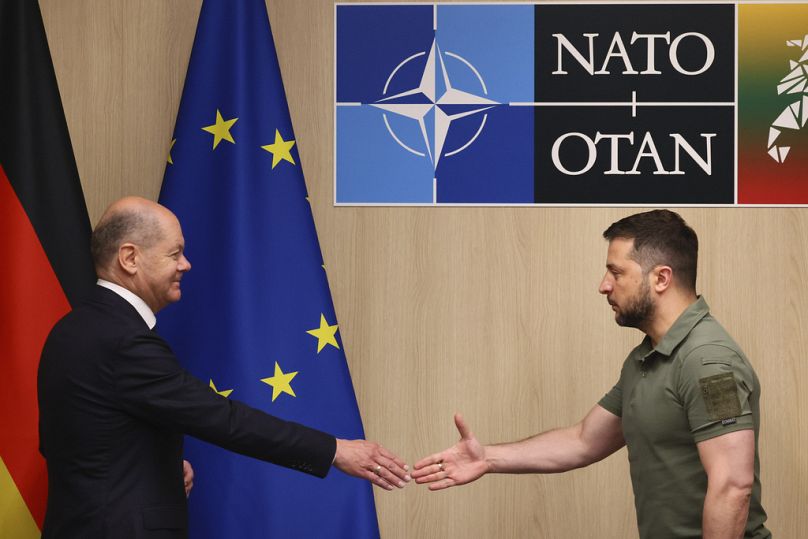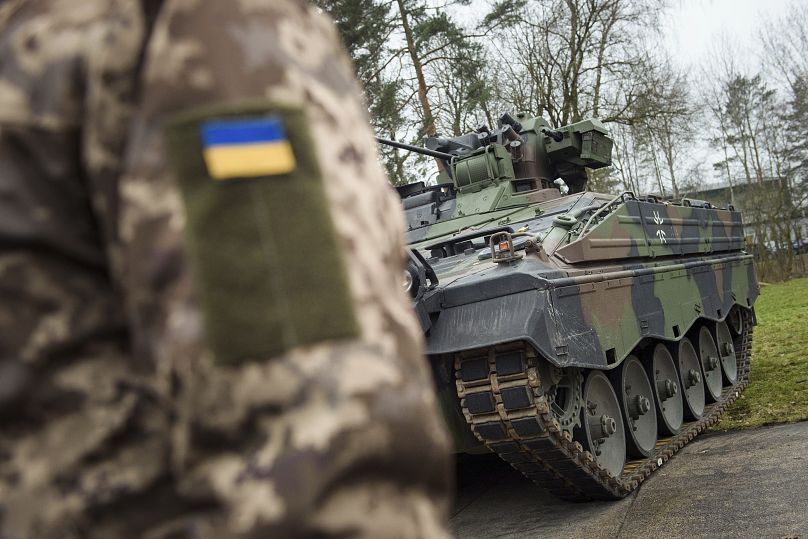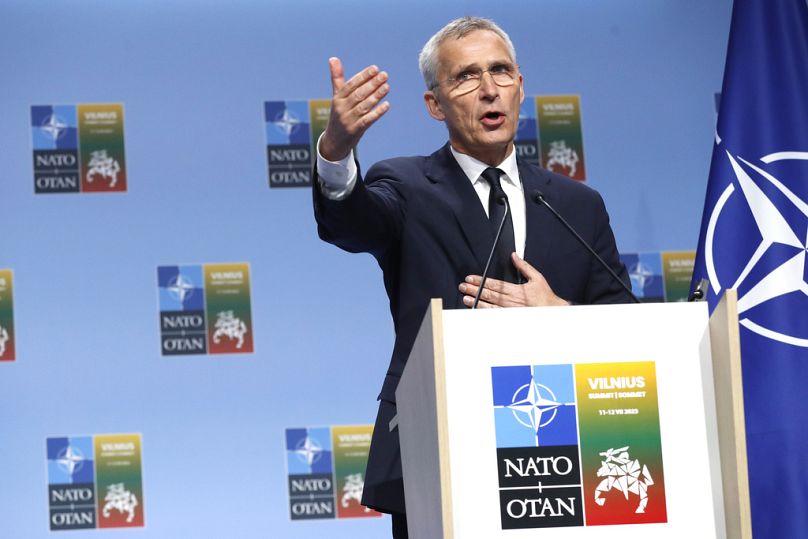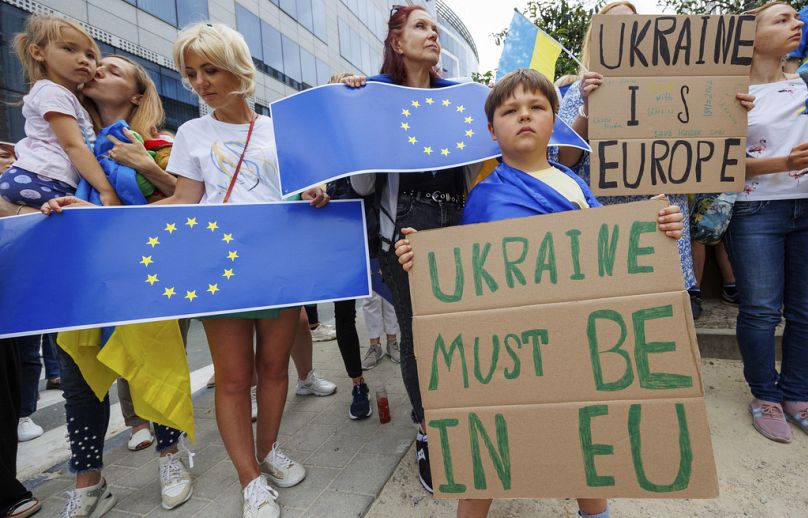If the West is serious about honouring Ukraine‘s merits for European security amid Russian aggression, Kyiv must receive comprehensive security aid in the future, Oliver Rolofs writes.
When I asked former Estonian President Toomas Hendrik Ilves on stage at the Munich Cyber Security Conference last year what lessons Germany could learn from Russia’s war against Ukraine to avoid future mistakes, his answer was clear: next time, better listen to Eastern Europeans.
Yet this time, at the recent NATO summit in Vilnius, was it better to listen to Germany and the US once more?
German Chancellor Olaf Scholz and US President Joe Biden rejected Ukraine’s ambitious post-war goal of becoming the 33rd member of the alliance — at least for now.
What sounds like a pragmatic, de-escalating decision to some is a negligent move for those who want maximum deterrence against Moscow while honouring Ukraine‘s merits for European security.
It is a move that may give Russia's Vladimir Putin false incentives to continue the war, prevent Kyiv‘s NATO ambitions and thereby even define a new war target, as can be seen now with Moscow's refusal to extend the grain deal — or in practice, the Kremlin's de facto declaration of war of hunger against the world.
The drive to provide Ukraine with weapons continues
Perhaps, however, the measures and support agreed in Vilnius will prove to be the wiser middle-of-the-road course in terms of security policy, even if an invitation to apply for membership does not yet imply a decision to approve it.
Nevertheless, it opens up new room for manoeuvre in both directions. On the one hand, we have the possibility for diplomacy that Russia is currently still refusing to engage in, but on the other hand also the possibility of drawing further red lines for Moscow.
Meanwhile, the West will now be judged by its drive to provide Ukraine with weapons, financial resources and know-how to achieve a swift decision.
Among other things, there is the newly agreed NATO-Ukraine Council, a multi-year programme to make the Ukrainian armed forces interoperable with NATO troops in the future, as well as guaranteed security support of the G7 countries or, in a weakened form, the security guarantee for Ukraine based on the Israeli model.
The US guarantee to Israel, which has now been in place for five decades, has proven to be a powerful lever for the Israeli state to defend its sovereignty in a troubled neighbourhood.
Qualitative Military Edge for Ukraine?
If the West is serious, Ukraine must receive comprehensive security aid in the future.
And if the G7 countries support Kyiv to the same extent as Washington has done with Israel since the 1970s, Ukraine would only stand to benefit from massive financial, military, arms technology, and foreign policy assistance.
But this must happen without delay in order to bring about a short-term turnaround for Ukraine on the battlefield, which is also a fight for freedom for Europe.
The formula is clear: the more territory Ukraine conquers before winter, and the more effectively it can protect its recaptured territory from new attacks, the better Kyiv's negotiating position will generally be.
And military aid to Ukraine must not only be about quantity.
That, as well, is what the Israeli model teaches. Ukraine, like Israel, deserves the most modern and powerful weapons, including the US-made F-35, the world’s most advanced fighter aircraft.
It is also about gaining an edge in military technology to defend against and effectively deter aggressors in the neighbourhood.
This component in the US-Israeli arms brotherhood, called “Qualitative Military Edge”, or QME, should thereby also be applied to Ukraine.
The doctrine states that Israel should always have a military-technical edge over the other countries in the Middle East, also in terms of quality.
Since Chinese and Iranian weapons systems are also being used by Russia against Ukraine, this would be an additional argument for the West to be on its guard, both security-wise and geostrategically.
This way, the West could build one of the most modern and powerful armies in the world in Ukraine to prevent Russia — already an aggressor — from further threatening Europe’s security in the future.
West Germany as a model for NATO membership
There is no question that this should be topped off with NATO membership for Ukraine, which by then — and perhaps already at the next anniversary summit in Washington — will hopefully be considerably strengthened.
Until then, security strategists in the capitals of EU and NATO member states should work on viable options that offer Ukraine a realistic prospect of much closer integration into Euro-Atlantic security structures.
One possible accession model could be the example of the then-divided Germany in the early phase of the Cold War: West Germany joined NATO in 1955, with only that part of the country under the protection of the alliance, which was also controlled by the freely elected federal government.
For the Soviet-occupied zone, the perspective remained that it might one day join if the balance of power there changed.
At the same time, involving NATO in a fight to liberate these parts of the country was out of the question.
So began the stationing of around 1 million soldiers from various NATO member states along the Iron Curtain in the western part of Germany as a military protection measure until the end of the Cold War.
Applied to Ukraine, the free parts of the country controlled by Kyiv could be admitted to NATO, including the stationing of powerful NATO units in the border area with Ukraine.
In doing so, NATO would not enter the war against Russia while also excluding the defence of the territories occupied by Russia, which can only join the alliance to the extent that Ukraine can liberate them.
Let's not forget Kyiv's EU membership bid, too
Another important signal would be to start the negotiation process for EU accession now, which has not yet begun, and which Ukraine applied for in April 2022 under an accelerated accession procedure.
Opening the most crucial of the 35 negotiation chapters immediately would be a major move by Brussels.
In addition to the 23rd chapter on judicial reform and fundamental rights and the 24th chapter on justice, freedom and security — which can be opened first and closed last — the 31st negotiating chapter on foreign, security and defence policy should also be brought forward in order to achieve rapid security integration with the West in this area.
In this context, in the future, Ukrainian government representatives should be able to participate regularly in the joint meetings of EU foreign and defence ministers, as well as at the ambassadorial level.
This would also be a clear signal of European strength vis-à-vis Moscow and an important building block for the reorganisation of European security towards the Kremlin — as well as for the reorganisation of the European security architecture in general.
Oliver Rolofs is a strategic security and communication expert. He was previously the Head of Communications at the Munich Security Conference and now runs the Munich-based strategy consultancy, CommVisory.
At Euronews, we believe all views matter. Contact us at view@euronews.com to send pitches or submissions and be part of the conversation.















